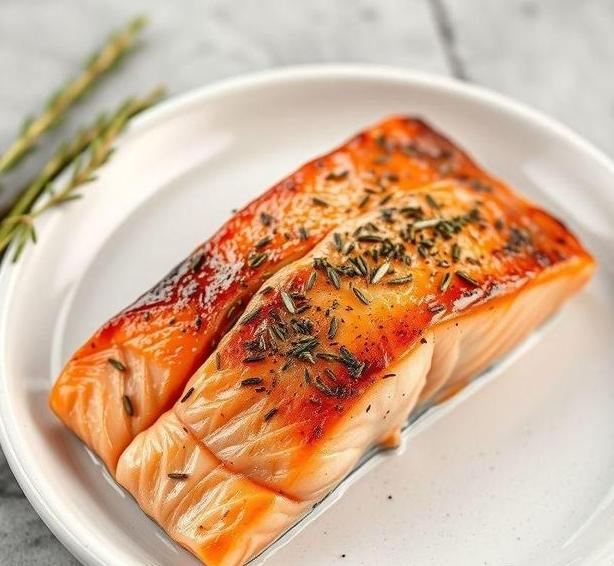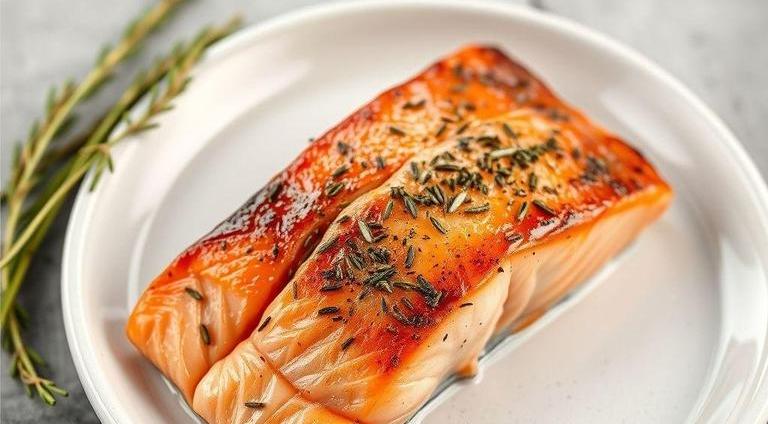Salmon is a beloved fish worldwide, celebrated for its tender texture, rich flavor, and versatility in the kitchen. Whether grilled, baked, broiled, or smoked, cooked salmon is a delicious option for a protein-packed meal. But once your salmon is cooked, how do you ensure that it stays safe to eat? How long can it sit in the fridge before you should toss it? Is there a way to prolong its freshness?
These are questions that often come up after enjoying a salmon dinner, especially when there’s leftover fish hanging out in your fridge. Like all cooked seafood, salmon has its own unique shelf life and spoilage patterns, and understanding these can help you avoid foodborne illnesses and wasted meals. Let’s break it down in detail to get you equipped with all the necessary knowledge to handle your cooked salmon like a pro.
Can Cooked Salmon Go Bad?
Yes, cooked salmon can absolutely go bad, just like any other cooked food. In fact, seafood, due to its high moisture content and delicate structure, tends to spoil faster than other types of protein, even when refrigerated. The bacteria that thrive in fish are often different from those found in meats like chicken or beef, so it’s crucial to handle cooked salmon with care to avoid any health risks.
Here are a few things to keep in mind:
- Time-sensitive: Cooked salmon doesn’t have a long lifespan outside the fridge. If left at room temperature for too long, it can develop harmful bacteria.
- Storage matters: How you store it after cooking plays a huge role in its shelf life. Improper storage can make salmon go bad much faster.
Shelf Life For Cooked Salmon

When it comes to how long cooked salmon can be stored, the general rule is: 3 to 4 days in the fridge. But there are variables that could shorten or lengthen this window depending on factors such as the freshness of the salmon to begin with, how it was cooked, and how well it’s stored.
- Refrigeration: If you store your cooked salmon properly in the fridge, you should be able to safely consume it for up to 4 days.
- Freezing: If you want to extend its shelf life, freezing cooked salmon can keep it good for up to 2-3 months. While freezing doesn’t improve the taste or texture much, it does prevent spoilage and ensures you won’t have to throw it out prematurely.
- Freshness factor: The fresher the salmon was when it was first cooked, the longer it may last in the fridge. If the salmon wasn’t the freshest when it went into the pan, it might not last the full 4 days.
Remember: It’s always better to be cautious. If you’re unsure about whether your salmon has been stored properly or if it has been in the fridge for more than a few days, it’s safer to discard it than to risk foodborne illness.
Common Signs Of Spoilage
You should always trust your senses when determining whether cooked salmon has gone bad. The signs are usually pretty apparent, but let’s go over them to make sure you know what to look for:
Smell
- Fresh salmon has a mild, clean, ocean-like smell. If your salmon has started to go bad, it will develop a strong, fishy odor, or it might even smell sour or rancid. If it smells off, it’s a clear sign to throw it away.
Texture
- Salmon should be moist and firm when fresh. If it becomes slimy or mushy, that’s a red flag. Spoiled salmon will lose its delicate texture and become either excessively dry or unpleasantly soft and slimy to the touch.
Appearance
- Look for any discoloration. Fresh salmon has a bright pink or orange color, depending on the type. If the fish starts turning gray or dull, that’s an indication that it’s not in its prime anymore.
- Mold growth is another sign of spoilage. While it’s rare, if you notice any fuzzy or discolored patches on the surface of the salmon, discard it immediately.
Taste
- If you’re still unsure, take a tiny bite of the salmon. If it tastes sour or bitter, it’s time to toss it. Good salmon should taste clean and savory, not off-putting.
How To Store Cooked Salmon?

Proper storage is key to keeping your cooked salmon fresh and safe to eat for as long as possible. Here’s how to do it:
Cool It Down Quickly
- After cooking, let your salmon cool down to room temperature, but don’t leave it sitting out for longer than two hours. If it’s a hot day, aim to refrigerate it within an hour to reduce the risk of bacterial growth.
Wrap It Tightly
- Once cooled, wrap the cooked salmon tightly in plastic wrap, aluminum foil, or store it in an airtight container. This helps prevent exposure to air, which can cause it to dry out and affect the flavor.
Refrigerate At The Right Temperature
- Store your salmon in the coldest part of the fridge-usually the back. Your refrigerator should be set to 40°F (4°C) or lower for optimal storage conditions.
Consider Freezing For Long-term Storage
- If you don’t think you’ll eat your cooked salmon within the 3 to 4-day window, freeze it. For best results, wrap it in plastic wrap first, then place it in a freezer bag or airtight container to avoid freezer burn.
- Label your salmon with the date so you can keep track of how long it’s been in the freezer.
Expert Tips
Here are a few tips and best practices from food safety experts to help you get the most out of your cooked salmon:
- Avoid leaving it out: Never leave cooked salmon out at room temperature for more than 2 hours. In hot weather (above 90°F or 32°C), the time reduces to just 1 hour. After that, bacteria can multiply quickly, leading to food poisoning risks.
- Reheat carefully: If you’re reheating leftover salmon, do so gently. Heat it until it reaches an internal temperature of 165°F (74°C) to ensure any potential bacteria are killed.
- Use it creatively: If you have leftover salmon that’s nearing its shelf life, use it in dishes like salmon salads, fish tacos, or salmon spread to make the most out of the leftovers.
- Check for freezer burn: When you freeze cooked salmon, make sure the packaging is air-tight. If not, freezer burn can occur, causing a dry and flavorless result. It won’t make you sick, but it won’t taste great either.
FAQs
How Long Can Cooked Salmon Last In The Fridge?
Cooked salmon can typically last 3 to 4 days in the fridge when stored in an airtight container. It’s important to refrigerate it within two hours of cooking to maintain its freshness.
How Can I Tell If Cooked Salmon Has Gone Bad?
Signs that cooked salmon has gone bad include a sour or rancid smell, a slimy texture, and discoloration. If it feels mushy or has a noticeably off taste, it should be discarded.
Can Cooked Salmon Be Frozen?
Yes, cooked salmon can be frozen. To maintain its quality, wrap it tightly in plastic wrap or aluminum foil, and place it in an airtight freezer bag or container. It can be stored for up to 2-3 months in the freezer.
How Long Can Cooked Salmon Stay Out Of The Fridge?
Cooked salmon should not be left out at room temperature for more than two hours. If the ambient temperature is above 90°F (32°C), the salmon should be discarded after just one hour.
Can Cooked Salmon Be Reheated?
Yes, cooked salmon can be reheated. However, to retain its moisture and flavor, it’s best to reheat it gently, either by steaming or using a microwave with a cover to prevent drying out.
What Happens If You Eat Bad Cooked Salmon?
Eating spoiled cooked salmon can lead to food poisoning, causing symptoms such as nausea, vomiting, diarrhea, and abdominal cramps. It is important to always check the freshness of your cooked salmon before eating it.
Can Cooked Salmon Go Bad In The Freezer?
While freezing cooked salmon can extend its shelf life, it can still go bad if stored improperly. Freezer burn, changes in texture, and loss of flavor may occur after extended storage, typically beyond 2-3 months.
How Should Cooked Salmon Be Stored To Prevent Spoilage?
Cooked salmon should be stored in an airtight container or tightly wrapped in plastic wrap or aluminum foil. It should be refrigerated within two hours of cooking to prevent bacterial growth.
Can Cooked Salmon Still Be Safe After 5 Days In The Fridge?
After 5 days, the safety and quality of cooked salmon may deteriorate. It is generally recommended to consume cooked salmon within 3-4 days to minimize the risk of foodborne illness.
Does The Smell Of Cooked Salmon Indicate If It’s Gone Bad?
Yes, the smell is a key indicator of spoilage. Fresh cooked salmon has a mild, ocean-like aroma. If it has a strong, sour, or ammonia-like smell, it has likely gone bad and should not be eaten.